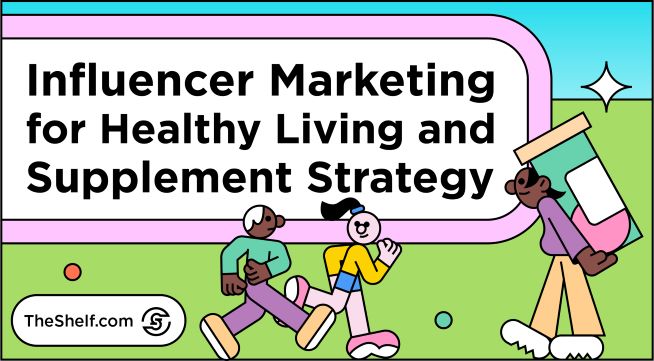The new year is in full swing, and our resolutions are being put to the test. Many have made a commitment to living healthier in 2024, and that includes taking supplements that provide essential nutrients. Influencer marketing around supplements was big in 2023 and is even bigger this time of year. There are plenty of brands competing for eyeballs and sales. This post details all you need to know to run an influencer marketing campaign for healthy living and supplement strategy that will make a splash.
If you’re in the wellness space, you know the importance of marketing healthy living at the start of each year. A month into the new year, it’s natural for consumer’s dedication to their resolutions to fade. That’s why it’s the perfect time to reinvigorate consumers’ fitness goals with stellar influencer campaigns. Read on for tips to develop your influence marketing supplement strategy.

Tap Into the Healthy Living & Supplement Craze
Healthy living never goes out of style, but it’s truly all the rage on social media this time of year. Nearly half, 48 percent of people made health-related New Year’s resolutions this year. About a third, 36 percent wanted to focus on improving their mental health. And another third, around 32 percent were specifically focusing on their diet. Aren’t we all just trying to do a little better for our bodies and minds?
This is great news for wellness and supplement brands. As of last year, 74 percent of Americans reported taking supplements of some kind. And 55 percent qualified as regular users. That’s more than 187 million people in the U.S. alone taking supplements on a regular basis. Talk about a wide consumer base.
So how do you cut through the noise? It’s all about creating a supplement strategy that gets people’s attention and inspires trust and consistency. The first step, however, is to understand your legal limits when advertising supplements online. Let’s break them down.
Understand Your Legal Limits
As with any health-related marketing, there are strict guidelines as to what you can and cannot do. And for good reason. It’s important to ensure consumers understand any wellness or supplement-related marketing is not medical advice.
In a similar vein, please understand that this paragraph — heck, this entire article — is not legal advice. The most important thing you can do for your brand’s supplement strategy is to consult your company’s legal team to make sure all your influencer marketing efforts are compliant with legal guidelines.
Here are the basics as a jumping-off point:
- Make sure your legal team signs off on all influencer and ambassador contracts.
- Make sure your influencer compensation is based on a fixed rate and not tied to sales, clicks, or impressions. That means it makes more sense to work with creators in an influencer capacity rather than an affiliate marketing role. (Learn more about the difference between influencer and affiliate marketing here.)
- Ensure you’re in compliance with all the appropriate truth-in-advertising laws and disclosures.
Again — and we can’t stress this enough — the best thing to do to make sure your supplement strategy is above board is to consult with your legal team.
Find the Right Influencers

Whether you’re working on your supplement strategy or overall influencer marketing campaigns, the right influencers are essential to your success. The beauty of influencer marketing is that there is an influencer for every target demo.
It’s common for supplements and wellness products to cater to a wide variety of audiences. A single product may span several demographics. If that’s the case for your brand, try to hire a diverse array of influencers. That way, each demographic of your target audience is represented.
While Gen Z and Baby Boomers may benefit from the same wellness initiative, they’re likely not watching the same influencers. And they may not integrate the product into their lives the same way. Remember to meet consumers where they are, with influencers they love to follow.
Create Content that Inspires Consistency
While it’s great to run campaigns that capitalize on those new year, new me wellness resolutions, wellness brands need to be profitable year-round. And most supplements work best when taken in a consistent regimen. Whether your product is a daily vitamin or something that lends itself to more varied usage, healthy living requires consistency. A healthy marketing strategy does too.
One of the best themes to highlight in your supplement strategy is consistency. Those who show up continually for their health and well-being are often the healthiest in the long run. Similarly, those who keep up with their influencer marketing, run the most fruitful campaigns.
It may make sense to work with influencers in more of an ambassador-style relationship. If your supplement has a recommended daily use, maybe you’d like to work with an influencer using the product over the course of a year. Posts could include get ready with me or morning or nightly routine content that shows the product being integrated into the influencer’s life and used consistently. Because supplements aren’t generally used once in isolation but over a period of time, it makes sense for your marketing to reflect that.
Examples of Super Supplement Strategy in Action
There are a lot of supplements on the market. And there are a lot of ways to market them. The best supplement strategy will be tailored to your brand, your product, and perhaps most importantly, your target audience. Take a look at how a couple brands are breaking through the noise of the supplement space.
ATHLETIC GREENS
If you’re in the wellness space, by now you’ve probably seen an ad for Athletic Greens. They’ve dominated the supplement space for healthy living influencer marketing for the last few years. We don’t see signs of them slowing down anytime soon.
One of Athletic Green’s strategies for sourcing influencers seems to be appealing to a wide variety of audiences through different influencers. The post above Ironman world champion Lucy Charles-Barclay. Not exactly your average Joe. Seeing mega-successful athletes like Lucy taking their supplements appeals to Athletic Greens’ authority in the wellness space. If the supplement is good enough for world-class athletes, it makes sense that layman consumers may believe it’s good enough for them too.
But Athletic Greens diversifies their influencer partnerships. Sure they work with elite athletes, but they also reach their audience through collaborations with healthcare professionals, lifestyle influencers, and everyday users. AG1 has seen great success with their UGC. It’s trendy to post the powdered supplement as part of your morning routine. Just like influencer Catherine Lockhart.
The supplement strategy from Athletic Greens is to diversify. Find diversity in the identities of your creators and their audiences. Healthnuts and gymrats love supplements, but so do busy working moms, college students, and grandpas. Find your target audience and look for the influencers they relate to. And if your supplement is one that could benefit a large variety of consumers, make sure your influencer strategy reflects that.
O POSITIV
Now, some supplements are more targeted. Take O Positiv, for example. They specifically make products to benefit women’s health. They do so with vibrant packaging, catchy slogans, and smart influencer marketing.
One of the best ways O Positiv spreads the love of their supplements on socials is through UGC. Influencer marketing is so effective in part because it feels more like word-of-mouth advertising than traditional ad models do. And word-of-mouth advertising is effective.
You know what’s even closer to word-of-mouth than influencers talking to large groups of followers? Normal, everyday people creating content on their own to share with their friends. And if they’re lucky, and the video gets some traction, a wider audience too.
Great products inspire buzz. UGC is a great way to make sure products consumers love stay buzzy. And because it’s organic, it’s often cheaper.
Finding influencers who align with your target audience can be great for your supplement strategy. But encouraging fans of your product to make content of their own about why they love it can help too! Those influencers are the best because they’re self-selecting. You don’t have to go looking for people who love your supplements. They’ll make content to tell you, and their followers, just how much they love it and why!
Another great benefit of UGC in the supplement strategy space is that creators often share their personal experience with a product. While your brand can’t guarantee certain results or act as a healthcare organization might, personal testimonials in UGC are a great way for potential customers to see what using the product might be like for them.
Sealing the Deal on Supplement Strategy
We hope this post helped you hone your influencer marketing supplement strategy. It’s easy for consumers to prioritize healthy living at the start of each new year. But we know it’s important to health and wellness companies like yours to ensure consumers keep up their healthy habits all year long.
Working with the right influencers within the legal guidelines is an important first step to making sure your supplement strategy is tight and effective. From there, you can inspire consistency in your consumers by creating fun, creative content that capitalizes on wellness trends and what’s best for the health and well-being of your target audience.
Whether you’re doing a seasonal push or hoping to create an evergreen supplement strategy you can use for years to come, we’re happy to help. Schedule a strategy call with one of our experts today, and we’ll work with you to create a marketing strategy that works for your brand, product, and customers.

About This Author
Ariana Newhouse | B2B Writer
I am a freelance writer and comedian based in Los Angeles. While making people laugh is my jam, it’s not always the company brand. So, I strive to make people feel something. My writing philosophy is collaborative, empathetic, and humanistic. At the end of the day, no matter the message, there are real people on both ends of the process.





